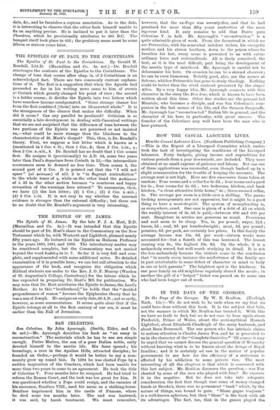THE EPISTLES OF ST. PAUL TO THE CORINTHIANS.
The Epistles of St. Paul to the Corinthians. By Gerald H. Kendall, Litt.D. (Macmillan and Co. 3s. net.)—Dr. Kendall rearranges the contents of the Epistles to the Corinthians. The change of tone that ocetiis- after chap. ix. of 2 Corinthians is an acknowledged fact There are two commonly current explana- tions of it. The first is a suggestion that when the Apostle had proceeded so far in his writing news came to him of events at Corinth which greatly changed his point of view ; the second is a bolder course; it divides the Epistle into two letters which have somehow become amalgamated. "Some strange chance has from the first combined [them] into an ill-assorted whole." It is the strangeness of the chance that makes the difficulty. When did it occur ? Can any parallel be produced ? Criticism is so essentially a late development in dealing with Canonical writings that we are not surprised that the difference of tone between the two portions of the Epistle was not perceived or not insisted on,—what could be more strange than the blindness to the characteristics of St. Mark's Gospel ? This, then, is Dr. Rendall's theory. First, we suppose a lost letter which is known as a (mentioned in 1 Cor. v. 9) ; then 1 Cor., 8; then 2 Cor. 7; then 2 Cor. x.-xiii., 8. Dr. Kendall has no doubt that 1 Cor. comes first. He assigns it (provisionally) to A.D. 54, some two years later than Paul's departure from Corinth in 52,—the intermediate occurrences seem to demand no less time. Then cornea 8, the second part of 2 Cor. It is pointed out that the "I will not spare" oeicro,uat) of xiii. 2 is "in flagrant contradiction" to the whole tenor of 7, while on the other hand the cbeiVizevos of i. 23 in the other section becomes "a courteous and happy revocation of the warnings here uttered." To summarise, then, we have (1) the lost letter;. (2) 1 Cor. ; (3) 2 Cor. x.-xiii. ; (4) 2 Cor. i.-ix. It is not easy to say whether the internal evidence is stronger than the external difficulty; but there can be no doubt that Dr. Rendall's argument is very interesting.






















































 Previous page
Previous page